Taiwan's ex-premier slammed for singing Chinese national anthem
95-year-old criticised by Taiwanese opposition, saying his singing of March of the Volunteers could be used to further Beijing's political agenda

Taiwanese former premier Hau Pei-tsun came under fire yesterday for singing the Chinese national anthem in Beijing, a move that opposition legislators faulted as “highly inappropriate”.
Hau, 95, in an interview aired by state-run China Central Television on Monday, was shown singing part of the anthem - March of the Volunteers - when asked whether he remembered it.
Hau was being interviewed about his role in a battle that marked the start of the Sino-Japanese war.
”Didn’t he know that whoever sang this song would be subject to capital punishment?” said Chen Chi-mai, a legislator of the Democratic Progressive Party (DPP), referring to a rule enforced during the tenure of late presidents Chiang Kai-shek and his son Chiang Ching-kuo.
”What he did is highly inappropriate,” Chen said.
The legislator said Hau, also a former defence minister, should have known the political significance of his act, which could be touted by Beijing to “glorify the mainland and woo the Taiwanese”.